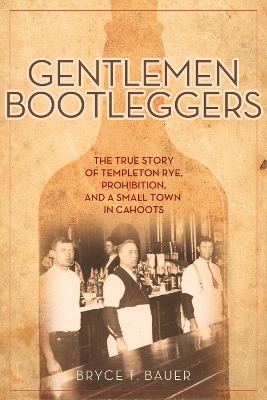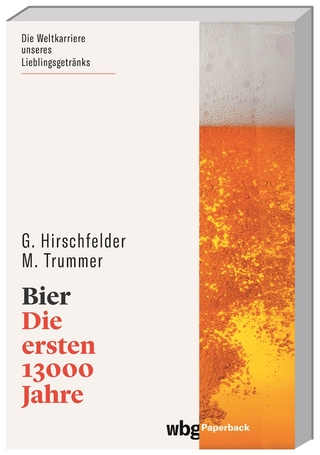
Gentlemen Bootleggers
The True Story of Templeton Rye, Prohibition, and a Small Town in Cahoots
Seiten
2016
Chicago Review Press (Verlag)
978-1-61373-522-0 (ISBN)
Chicago Review Press (Verlag)
978-1-61373-522-0 (ISBN)
- Lieferbar (Termin unbekannt)
- Versandkostenfrei innerhalb Deutschlands
- Auch auf Rechnung
- Verfügbarkeit in der Filiale vor Ort prüfen
- Artikel merken
2014 Benjamin F. Shambaugh Award Winner
2015 Spirited AwardsTop Ten Finalist
During Prohibition, while Al Capone was rising to worldwide prominence as Public Enemy Number One, the townspeople of rural Templeton, Iowa—population just 428—were busy with a bootlegging empire of their own. Led by Joe Irlbeck, the whip-smart and gregarious son of a Bavarian immigrant, the outfit of farmers, small merchants, and even the church monsignor worked together to create a whiskey so excellent it was ordered by name: "Templeton rye."
Just as Al Capone had Eliot Ness, Templeton’s bootleggers had as their own enemy a respected Prohibition agent from the adjacent county named Benjamin Franklin Wilson. Wilson was ardent in his fight against alcohol, and he chased Irlbeck for over a decade. But Irlbeck was not Capone, and Templeton would not be ruled by violence like Chicago.
Gentlemen Bootleggers tells a never-before-told tale of ingenuity, bootstrapping, and perseverance in one small town, showcasing a group of immigrants and first-generation Americans who embraced the ideals of self-reliance, dynamism, and democratic justice. It relies on previously classified Prohibition Bureau investigation files, federal court case files, extensive newspaper archive research, and a recently disclosed interview with kingpin Joe Irlbeck. Unlike other Prohibition-era tales of big-city gangsters, it provides an important reminder that bootlegging wasn’t only about glory and riches, but could be in the service of a higher goal: producing the best whiskey money could buy.
2015 Spirited AwardsTop Ten Finalist
During Prohibition, while Al Capone was rising to worldwide prominence as Public Enemy Number One, the townspeople of rural Templeton, Iowa—population just 428—were busy with a bootlegging empire of their own. Led by Joe Irlbeck, the whip-smart and gregarious son of a Bavarian immigrant, the outfit of farmers, small merchants, and even the church monsignor worked together to create a whiskey so excellent it was ordered by name: "Templeton rye."
Just as Al Capone had Eliot Ness, Templeton’s bootleggers had as their own enemy a respected Prohibition agent from the adjacent county named Benjamin Franklin Wilson. Wilson was ardent in his fight against alcohol, and he chased Irlbeck for over a decade. But Irlbeck was not Capone, and Templeton would not be ruled by violence like Chicago.
Gentlemen Bootleggers tells a never-before-told tale of ingenuity, bootstrapping, and perseverance in one small town, showcasing a group of immigrants and first-generation Americans who embraced the ideals of self-reliance, dynamism, and democratic justice. It relies on previously classified Prohibition Bureau investigation files, federal court case files, extensive newspaper archive research, and a recently disclosed interview with kingpin Joe Irlbeck. Unlike other Prohibition-era tales of big-city gangsters, it provides an important reminder that bootlegging wasn’t only about glory and riches, but could be in the service of a higher goal: producing the best whiskey money could buy.
Bryce T. Baueris a Hearst Award winning journalist who has written for Saveur, the Daily Iowan, the Cedar Rapids Gazette, and other publications. He is coproducing and cowriting the documentary Whiskey Cookers: The Amazing Story of the Bootleggers of Templeton, Iowa.
| Erscheinungsdatum | 22.09.2016 |
|---|---|
| Zusatzinfo | Illustrations |
| Verlagsort | Chicago |
| Sprache | englisch |
| Maße | 152 x 228 mm |
| Gewicht | 367 g |
| Themenwelt | Literatur ► Biografien / Erfahrungsberichte |
| Sachbuch/Ratgeber ► Essen / Trinken ► Getränke | |
| Sachbuch/Ratgeber ► Geschichte / Politik ► Allgemeines / Lexika | |
| Geisteswissenschaften ► Geschichte ► Regional- / Ländergeschichte | |
| Recht / Steuern ► Strafrecht ► Kriminologie | |
| ISBN-10 | 1-61373-522-7 / 1613735227 |
| ISBN-13 | 978-1-61373-522-0 / 9781613735220 |
| Zustand | Neuware |
| Haben Sie eine Frage zum Produkt? |
Mehr entdecken
aus dem Bereich
aus dem Bereich


